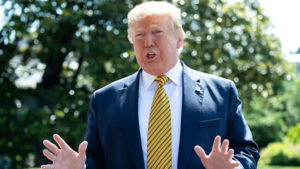 US President Donald Trump’s administration is to make it more difficult for poorer legal migrants to extend their visas or gain permanent resident status (a green card).
US President Donald Trump’s administration is to make it more difficult for poorer legal migrants to extend their visas or gain permanent resident status (a green card).
The rule targets migrants who rely on public benefits, such as food aid or public housing, for more than a year.
Their applications will be rejected if the government decides they are likely to rely on public assistance in future.
The rule change would reinforce “ideals of self-sufficiency,” officials said.
The new regulation, known as a “public charge rule”, was published in the Federal Register on Monday and will take effect on 15 October.
Who will be affected?
Immigrants who are already permanent residents in the US are unlikely to be affected by the rule change.
It also does not apply to refugees and asylum applicants.
What’s the state of illegal immigration in US?
Six surprising statistics about immigrants in the US
But applicants for visa extensions, green cards or US citizenship will be subject to the change.
Those who do not meet income standards or who are deemed likely to rely on benefits such as Medicaid (government-run healthcare) or housing vouchers in future may be blocked from entering the country.
Those already in the US could also have their applications rejected.
An estimated 22 million legal residents in the US are without citizenship, and many of these are likely to be affected.
Civil rights groups have said the move unfairly targets low-income immigrants. The National Immigration Law Center (NILC) has said it will sue the Trump administration to stop the regulation from taking effect.
But the White House said the current system favours immigrants with family ties rather than those who “are self-sufficient and do not strain our public resources”.
A change that fits Trump’s larger goal
Although much of Donald Trump’s rhetoric during the 2016 presidential campaign was directed at what he saw as the dangers of undocumented immigration, it has been clear for some time that this is just part of a larger goal to reduce US immigration levels in total – both illegal and legal.
Since his inauguration, Mr Trump has cut the number of refugees admitted to the US each year. The White House blocked a Senate compromise immigration proposal in January 2018 in part because it did not include changes to the legal immigration system.
During those negotiations, Mr Trump reportedly made comments about preferring immigrants from places like Norway, rather than “shithole” countries.
Now the administration is making it more difficult for less affluent individuals to obtain legal US residency – or perhaps even enter the country at all.
This sets up an election clash next year between a president sharpening and broadening his immigration rhetoric and Democrats, many of whom have said they believe all immigrants, legal or otherwise, should be eligible for public aid.
Why is the rule change happening?
President Trump has made immigration a central theme of his administration. This latest move is part of his government’s efforts to curb legal immigration.
“To protect benefits for American citizens, immigrants must be financially self-sufficient,” a White House statement read after the rule change was announced.
It said two-thirds of immigrants entering the US “do so based on family ties rather than on skill or merit”.
More than three-quarters (78%) of households headed by a non-citizen with no more than a secondary school education used at least one welfare programme, it added.
Ken Cuccinelli, the acting director of the US Citizenship and Immigration Service, announced the regulation at a press conference on Monday.
He said finances, education, age, and the level of an applicant’s English-language skills will all be considered in green card applications. “No one factor alone” will decide a case, he added.
Media captionMagdalena’s plea for her detained father: “Let my dad be free like everybody else please.”
The Trump administration has also cracked down on illegal immigration. Last week, about 680 people were arrested in Mississippi on suspicion of being undocumented migrants.
Pictures emerged of children crying after being separated from their parents. Officials said they took steps to ensure any children were properly cared for.
The number of would-be migrants apprehended at the US southern border with Mexico has been rising over the last two years.
However, the number of undocumented immigrants in the US is falling, according to recent analysis from the Pew Research Center.
In May, President Trump put forward proposals for a new skills-based immigration system, designed to favour younger, better educated, English-speaking workers.
